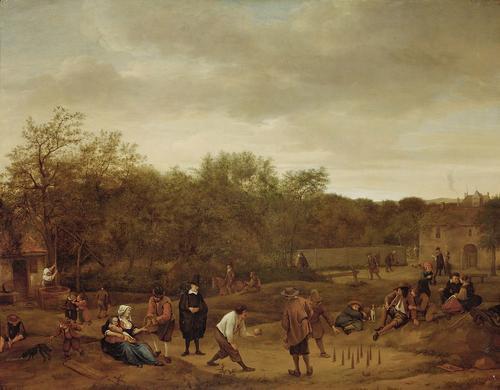 | |
| Farmers Playing at the Skittles Jan Steen (1665) |
First off, not the candy. Skittles is a game of knocking down pins, which has had many derivations and evolutions over the course of human history (including modern USA style bowling). Some try to connect Skittles to Ancient Greece, or Rome. Others suggest that the earliest known game of this type comes from 3rd or 4th Century Germany, where monks would try to knock over a kegel (or club) with thrown stones (Kegelen is the modern German term for Skittles). Kayles (again, Skittles) players show up in 14th C France as well. Whatever its origin, for some reason, we like throwing heavy things at pins.
For the basic rules, I'm using a games handbook from 1892. Nine pins are used in the game, placed on a wooden board in a diamond pattern (a square, with one point directed at the player). From a distance of about 21 feet, the player should throw a heavy round (or cheese-shaped) ball, attempting to knock down as many pins as possible (though the book doesn't suggest a way to "win," the best players knock down the most pins in the least amount of time and/or throws). Ordinarily, one step is allowed before releasing the ball, but the "trotting" variation allows multiple steps. Other Nineteenth Century variations include: Nine Pins, Dutch Pins, Four Corners, and Rolly Polly.
As suggested, the variations on this game are legion. Pins come in a variety of shapes and sizes (and materials), sometimes employing a "king pin" which is taller. Often, the kingpin should be knocked over first, or maybe it is the only pin you want to knock down, or the only one you should leave standing. The pins will only be placed on a board if you're throwing at them. Otherwise, they may be placed on a smooth patch of ground, or at the end of a wooden alley in a pub. The ball might be made of rubber or wood (with lignum vitae being the old favorite). At times the ball (or cheese, or even a club) should be thrown, but it might be bowled, or bounced as well. In the French variation, after the first bowl is taken at a distance, a second throw (if needed) is done at point-blank range. Scoring is another place for wide variety, with the goal of some games being the least number of bowls to knock down the nine pins, to trying to knock down the most pins in a certain number of throws.
Confusing isn't it? Don't worry too much. Skittles is, at its heart, a simple game. Its history is much like the history of Fairy Tales. The core remains the same while the details are altered to best fit each community. Like any good traveler, if you want to get involved in the game, let the locals show you how to play. If you want to make up your own variation to put in a story, or to play at home, feel free. You'd hardly be the first.
Rule Book (pg61-63) - http://books.google.com/books?id=ljAPAQAAMAAJ&pg=PA38&lpg=PA38&dq=quoits+history&source=bl&ots=Nff7pjlbrM&sig=3MTsT1pgz4-lyfIfZuTmoaVTg2I&hl=en&sa=X&ei=sCasU4OkO8OeyATchIHIDw&ved=0CGkQ6AEwCTgK#v=onepage&q=quoits%20history&f=false
History and rules variations by region - http://www.tradgames.org.uk/games/Skittles.htm
London Skittles - http://www.londonskittles.co.uk/content/history.htm


